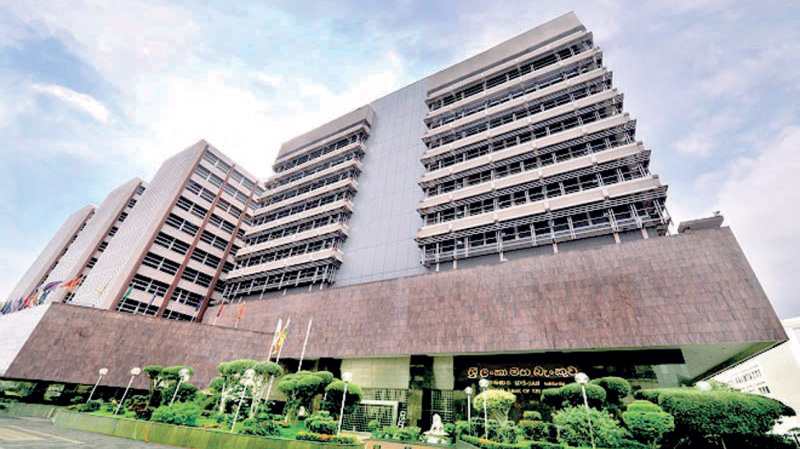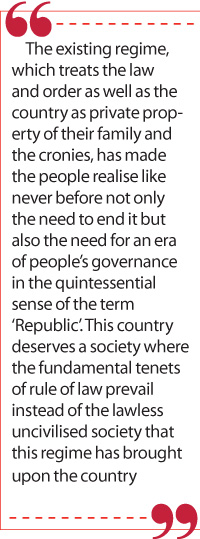Tuesday Feb 17, 2026
Tuesday Feb 17, 2026
Wednesday, 11 August 2021 00:00 - - {{hitsCtrl.values.hits}}

The present Government’s irresponsible financial policy has already brought its inevitable consequences to bear upon the country: the confidence of investors has completely eroded; country’s credit ratings were downgraded to ‘high risk’ category by major international credit rating institutions in 2020. This in effect has closed the doors of international financial markets for the Government to raise any foreign currency debt, thereby sounding the death knell of financial stability of the country
 The economic crisis is deepening…
The economic crisis is deepening…
We are experiencing today the worst-ever public finance crisis in the history of the country.
National debt has skyrocketed as a consequence of grossly undisciplined public finance policies of the Government. The mega projects of 2005-2015 era, financed through short-term high-interest rate commercial debt, with no economic returns at all or no revenue generation capacity for debt servicing, are at the core of the problem, as I have been continually pointing out.
The mega deals that were invariably involved with those mega projects, where the manipulation of cost estimates by simply multiplying the actual figure by several times had been made to appear the norm rather than the exception, remain largely responsible for the current debt-crisis—apart from being robberies of unprecedented scale amounting to crimes against the nation.
Further, the post-Presidential Election package of indiscriminate tax-cuts introduced in December 2019, hardly benefiting anybody other than large businesses, stands in my view as the most irresponsible manoeuvre of public finance ever made by a government since independence.
According to official statistics, this tax-cut package resulted in a drastic 30% drop in Government revenue reducing the latter to a dismal 9.2 % of the GDP—the lowest ever in history—making the debt service obligations amount to a staggering 70% of Government revenue.
The Government, losing its revenue though this irresponsible tax-cut, then resorted to massive borrowings from the Central Bank, through money printing, and other commercial banks in order to meet the expenditure on public servants’ salaries and pension payments, subsidies, Government investments and other expenses. Consequently, the total public sector debt spiralled to 109.7% of the GDP—yet again the highest ever in history.
I have already pointed out that the true debt burden would exceed 112% of the GDP in actual fact when the effect of accounting chicanery made by the Government on international sovereign bonds (i.e. understating the pay-off commitments arising from ISBs by taking, in the calculations, their devalued secondary market price as opposed to the nominal value) is removed.
A misleading claim often made by the Government is that between 2010 and 2015 there was an annual economic growth rate of 7% which declined to 2-3 % during the period of ‘Good Governance’ administration. The Government also questions about development investments made out of borrowings made during the ‘Good Governance’ era.
 |
 |
 |
 |
The truth is that the totally irrational and unsustainable construction bubble of 2010-2015, created using a credit bubble of high interest commercial loans, threw the country into a vicious debt cycle of ever-spiralling magnitude by 2015. This is evident from the fact that over 70% of the total borrowings made by the ‘Good Governance’ administration was simply for servicing the debts incurred during 2005 to 2015.
The present Government’s irresponsible financial policy has already brought its inevitable consequences to bear upon the country: the confidence of investors has completely eroded; country’s credit ratings were downgraded to ‘high risk’ category by major international credit rating institutions in 2020. This in effect has closed the doors of international financial markets for the Government to raise any foreign currency debt, thereby sounding the death knell of financial stability of the country.
This is analogous to an individual, or an organisation, of this country being identified by the Credit Rating Information Bureau (CRIB) as one with no capacity to pay back debt. In other words, the Government has plunged the country into a debt-crisis where its capacity to borrow money even for the purpose of paying off existing debt has entirely eroded.
In fact, there have been instances in the past when the country experienced financial crises of some degree, involving balance of payment issues, such as those arose during 1988 and 2008, where the Government managed to safely navigate through the crisis due to the support of the IMF and the fact that the international financial markets were accessible by the country. However the situation today is that the financial position of the Government has plunged to such dangerous depths where borrowing of funds locally or internationally has become virtually impossible.
With access to international financial markets virtually closed for the country, official reserves have depleted down to $ 3 billion (figures 1 and 2), according to some leaders of the Government as well as senior officials. If this is the case, those reserves will barely suffice for importation of goods and services necessary for just two months.
In actual fact, the ability of commercial banks to open letters of credit for importation of such essential goods as food items including milk powder, pharmaceuticals, fertiliser, and interim and capital goods has severely diminished due to total depletion of their foreign currency assets, which reportedly stood at a negative $ 2.4 billion by last June.
The fact that leaders of the Government are concealing from the public is that, when accounted for the net foreign currency liabilities of the Central Bank, the net foreign currency assets held by the overall banking system of the country amounts to a shocking $ negative 3.9 billion. This renders the Government completely incapable of meeting the foreign currency liabilities amounting to $ 7.4 billion that become due within the next 12 months. The Government is no longer able to commence imports even if it decides to lift the currently gazetted import restrictions.
Is this a crisis nobody knew and forewarned of?
No, absolutely not. In actual fact, what has happened is only rapid aggravation into an uncontrollable state, due to irresponsible and arrogant decisions of the present Government, of an otherwise obvious crisis. While the economic impact of the spread of COVID-19, which the Government is misleadingly blaming as the main cause of the crisis, has in fact been a contributory factor to some extent, nevertheless the responsibility of failure to contain the crisis, with no scientific approach to manage the pandemic, lies squarely with the Government.
The impending crisis was being consistently and continually forewarned of by independent economic analysts, ex-senior officials of the Central Bank and the Ministry of Finance, and international organisations.
In the book entitled ‘Ala Palu Arthikaya’ (The Doomed Economy) written by me in 2014, the volatility and unsustainability of economic bubbles, such as the construction bubble fuelled by the credit bubble, was clearly expounded, and in the book entitled ‘Mulya Agadhayak Abhyasa’ (On the Brink of a Financial Precipice) written in 2016, I warned and forecasted that Sri Lanka was headed for a financial crisis of unprecedented magnitude by 2023. And in 2016, I forewarned the Cabinet of Ministers of the same through a Cabinet memorandum. Then, right since January 2020, we started educating the people on potential financial bankruptcy that the Government was headed for following its December 2019 package of indiscriminate tax-cuts.
Over the past few months, we have been calling upon the Government to put before the people a prudent, new public financial management framework, and to implement it with the approval of the people in the face of the grave financial crisis facing the country. We have also repeatedly emphasised the importance of interacting closely with international financial Institutions, stabilisation of public finance, and debt restructuring. And we offered our unconditional support for its implementation shedding all political differences with the Government.
Government leaders to be forced out of hallucination
The arrogant and irresponsible rhetoric of the Government will not save the day. The solution to the problem should, logically, begin with understanding and admitting the problem, unfortunately the reactions of the Government do not show that the Government has the wisdom or sincerity to do that. It has been behaving as if the crisis was over following the settlement of just one instalment on 28 July; making arrogant statements demeaning the importance of international support; mocking at those who expound the severity of the problem; and making such loose statements as ‘there have been instances when reserves were even lower’. Those deceptive and elusive tactics could only aggravate the position.
The present leadership, through its actions in almost all spheres of activity, including the economy, environment, foreign relations, epidemic control, and agriculture, has made abundantly clear its gross incompetence and incapability in finding a solution to the crisis. The said actions leave no room for doubt about what can be expected from the present leadership: bizarre policy decisions amounting to ‘killing the golden egg laying hen’ or creating multiple complex problems by attempting to solve one.
Grim days ahead?
The acute shortage of foreign currency has already brought in the inevitable: a black market where the US dollar sells at around Rs. 240 to 250. In the face of the shortage, the commercial banks are resorting to rationing among their preferred customers the limited amount of dollars that they receive; parents with children studying abroad are struggling to send them money for living expenses.
Private sector LPG gas distributors have already suspended their imports. Ceylon Petroleum Corporation, sitting on a mountain of forex debt to the tune of $ 3.4 billion, has become virtually bankrupt. Inability to import oil and coal would mean an energy crisis where production in all sectors will collapse. This would mean an era of widespread poverty, hunger, and unemployment where cooking would return to firewood hearths, and travel to bullock carts, and even an ordinary disease could mean death. Simply, the country would literally return to a re-stage of 1960s.
The scarcity of fertilisers and chemicals would bring in within months the precursors of widespread famine, far beyond the adversities it has currently brought into the export economy. A potentially famine-stricken country, further depressed by such other hardships as the already set-in and worsening gas shortage, and potential shortage of petroleum and electricity, could trigger in all probability a massive social explosion of the likes of what has engulfed today the countries such as Lebanon, Cuba and Venezuela. The approach of barrackisation being increasingly resorted to by the present regime will only expedite that explosion.
What needs to be done?
We emphasise yet again what we have been stressing again and again. The first and foremost would be to improve Government revenue though a major review and reversal of the indiscriminate tax-cut package granted in December 2019. This would instil confidence among the foreign and domestic investors and the financial institutions about the stability of public finance framework of the country.
Equally necessary would be to control those pompous mega projects and corrupt construction deals (such as selling of highways, prime property and power and energy infrastructure to foreigners), and to minimise Government expenditure through selective investment in revenue generating projects and efficiency enhancements in public institutions. This would minimise the need for money printing, thereby contributing to stabilising public finance.
The other measure of paramount importance would be debt-restructuring in negotiation with lending institutions on the basis of a prudently formulated new public finance management framework, where the amounts to be settled over the next few years would be commensurate with the pay-off capacity of the Government. In the meantime, the need for investor confidence building compels the Government to act in cooperation with international financial institutions and to follow a balanced prudent foreign policy approach with all countries.
Resorting, otherwise, to foreign currency swaps with only a handful of selected countries will only lead to marginally delaying the impending explosion while substantially intensifying its impact. Obviously, such an approach would not be in the interests of anybody other than the foreigners who would eventually own our valuable national assets including prime property, and the white collar criminals in the regime who are all out to re-stage the mega commissions-spree that they were so used to during their previous regime.
The existing regime, which treats the law and order as well as the country as private property of their family and the cronies, has made the people realise like never before not only the need to end it but also the need for an era of people’s governance in the quintessential sense of the term ‘Republic’. This country deserves a society where the fundamental tenets of rule of law prevail instead of the lawless uncivilised society that this regime has brought upon the country.
In the meantime, there needs to be established a system of scientific governance for everything ranging from handling of a pandemic to management of state institutions, eliminating the system of administration that acts upon the whims and fancies of political buffoons in power. A fair, level-playing field of equal opportunity should be created for all entrepreneurs, liberating the business-space from the handful of regime-sponsored cronies. The longer it takes for us as a people to realise those imperatives the ever closer we get to a similar destiny as that of anarchic Zimbabwe or barrackised Myanmar.
The country is already experiencing the disturbing trends of exodus of educated youth out of the country, while the rich and affluent are securing resident visas in foreign countries, siphoning their wealth into foreign banks. This trend, if continued unabated, could reduce Sri Lanka into a desert devoid of the essential pool of talented human resources. This is the hour that the country needs people with vision and resolve, merit and integrity, and competence and character to rise to the occasion, displacing the corrupt uncivilised stratum of political buffoons that has clung onto the helm of political power in the country.